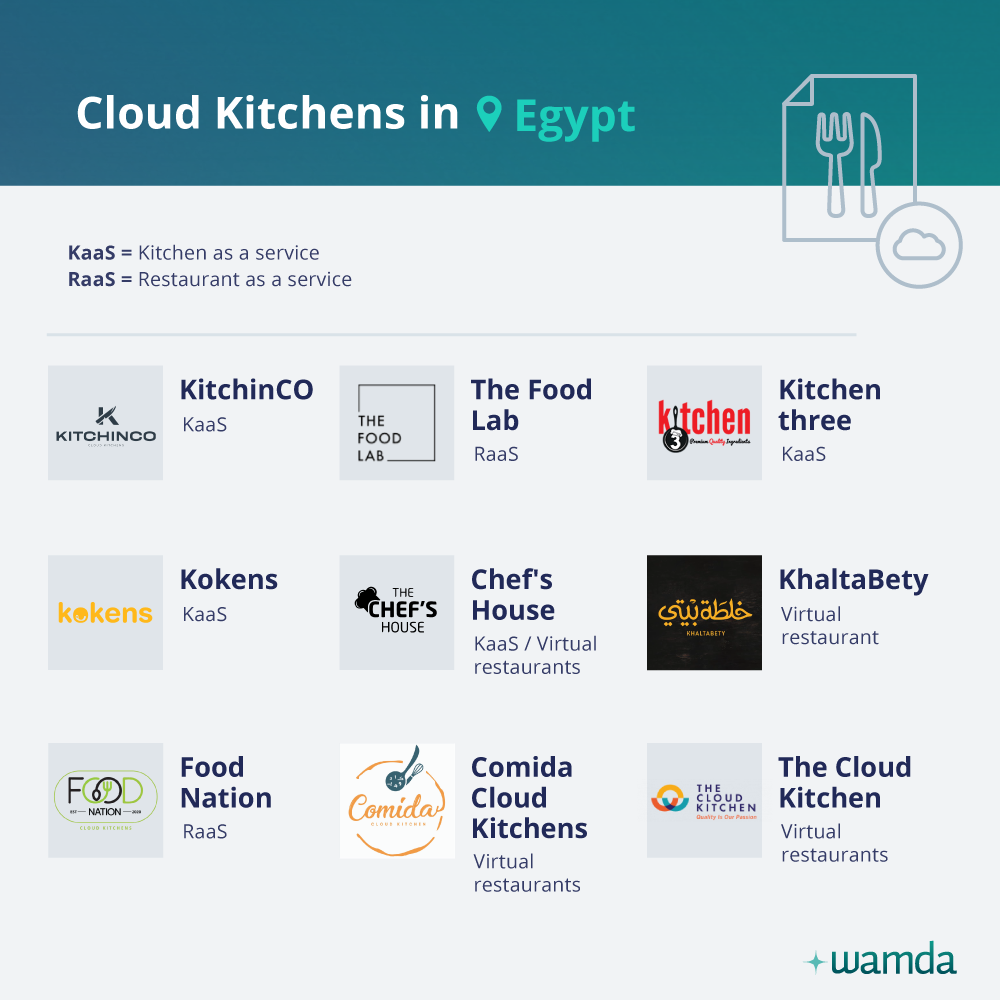Do cloud kitchens stand a chance in Egypt?

The meteoric rise of cloud kitchens in the UAE is beginning to permeate through to other parts of the Middle East. Across the region, new cloud kitchen operators have emerged, alongside startups offering tech solutions to these delivery-only kitchens, hoping to replicate the success of startups like Dubai-based iKcon, which was acquired by Reef Technologies, and Kitopi, which raised $415 million in a round led by Softbank.
In Egypt, where the food delivery landscape is dominated by talabat and elmenus, cloud kitchens are the latest addition to the foodtech segment. Yet the pace of growth has been somewhat muted, burdened by a lack of awareness and low penetration of online food ordering.
Leading the charge in Egypt is Food Nation, which launched in Cairo in 2020 with its first cloud kitchen accommodating 35 different brands. The company, powered by Tivoli Dome, a physical food-court based in Heliopolis, offers smart kitchen spaces designed specifically for delivery-only restaurants. It is planning to establish the country’s largest cloud kitchen, set to accommodate over 41 kitchens.
According to Ahmed AlNaggar, project manager at Food Nation, the move is aimed to bring about awareness as well as encourage more restaurants to pivot to this ever-growing model.
“This comes in sync with global trends impacting restaurant business; cloud kitchens are becoming a global norm in the F&B sector due to their cost and operational efficiency. And this is where the future of the restaurant business is headed abroad as well as in Egypt. But unlike global markets, there is a massive lack of awareness about cloud kitchens here,” he adds.
In an attempt to help its virtual restaurants boost their brand visibility, the company offers dine-in services in one of its locations. "Having dine-in venues attached to the cloud kitchens will play a role in building the customer trust in these virtual brands. This will ultimately boost the adoption of cloud kitchens," Alnaggar explains.
Overall, the growing interest of entrepreneurs to venture into the cloud kitchens segment arises from a dire need for a solution that could help restaurants bounce back from the repercussions of the pandemic in the country. This is why most of the cloud kitchen operators in Egypt have adopted the “kitchen as a service” (KaaS) model, offering brands and restaurants kitchen space to lease.
Mostafa Wahdan, co-founder of Chef House, a KaaS cloud kitchen that also operates its own virtual restaurants, says the main reason he started his business was to help restaurants survive by enabling them to grow their delivery footprint and expand to new regions.
"Sixty per cent of restaurants fail in their first year of operations, and 80 per cent close indefinitely after five years in business. Restaurants are struggling and many are losing millions of [Egyptian] pounds every year. We started this business to help business owners to revive their brand and build a moat in such a red ocean market," says Wahdan.
While cloud kitchens have proven to be a cost-effective solution for many restaurants brands looking to expand geographically without the need to build physical locations, the delivery-only model has its own set of challenges too. Restaurant operators have to spend hefty amounts on their marketing strategies to acquire customers. As a result, many small restaurants are unable to transition to or rely solely on cloud kitchens due to their inability to cover the marketing costs.
Online food delivery
Ideally, cloud kitchens are built around the online delivery experience. However, this is not necessarily the case in Egypt, where the majority of food delivery orders are placed on the phone instead of online. As such, cloud kitchen operators tend to cater to both online as well as offline users.
"Online food delivery is still scratching the surface, and it is not set to make gigantic leaps, at least in the short term. The Egyptian consumer is not yet accustomed to this way of ordering. We chose to have an online [strategy] at first just to get our operations up and running. I personally don't care whether the order is placed online or offline. I will go to the customers wherever they are," says Wahdan.
The fact that online sales constitute about 6 per cent of all food and beverage sales is the reason why cloud kitchens are still widely regarded as an early-stage market with subdued VC activity. Last month, Egypt-based “cloud hub operator” Takery raised a pre-Seed funding round, with plans to secure up to $3 million in 2022. With this raise, Takery would be the country’s first cloud kitchen operator to raise VC funding.
Eventually, as the adoption of cloud kitchens becomes more commonplace, more customers as well as businesses will increasingly turn to online food ordering, especially in light of the fact that most KaaS startups offer their restaurant clients the opportunity to collaborate with food delivery aggregators like elmenus and Talabat.
For Michael Asaad, founder of Toro cloud kitchens, the reason why cloud kitchens lag behind other sectors in terms of popularity is the substandard food delivery logistics.
"The real game-changer would be fast and efficient delivery logistics. Delivery and packaging remain a trouble area for delivery-focused businesses. Lots of food doesn't travel well, resulting in the overall customer experience taking a serious hit,” he says.
As customer expectations become loftier, the traditional models for the current on-demand delivery models become insufficient and ill-suited to meet the growing demand.
“The market boasts a lot of players when it comes to food delivery, but we have to come up with an alternative model for food delivery business and cloud kitchens, that is faster and more efficient,” adds Asaad.
Looking ahead, the cloud kitchen market will spawn more players as the demand grows with more virtual restaurants likely to launch and fail quickly. Continuous investments in customer-centric innovations will be key to ensuring sustainable growth in this market going forward.



